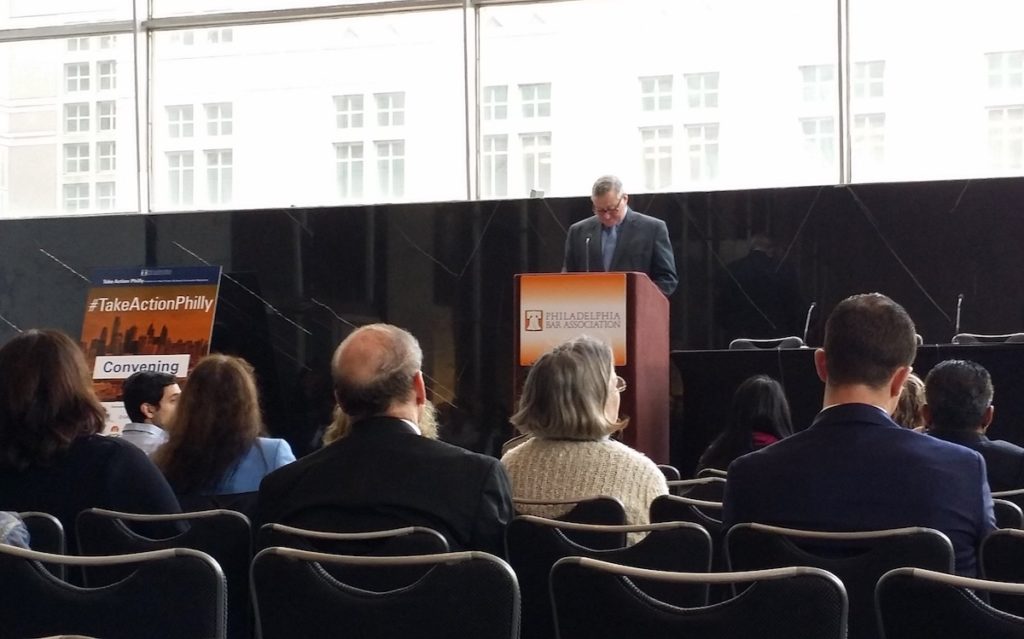‘We don’t need volunteers, we need badass allies’
 February 27, 2017
Category: Event, Featured, Medium, Method
February 27, 2017
Category: Event, Featured, Medium, Method
There was too much to talk about in just three hours at the first convening of Take Action Philly, a gathering of the Philadelphia legal community discussing how to best aid the city’s immigrant and refugee populations.
That’s just the nature of discussing the complicated world of immigrant and refugee policy — which includes topics like adjustment of status, applying for asylum, what previous cases dealing with this topic mean for future litigation, the executive orders that have already been put into motion and much more.
But as it was made clear multiple times throughout the event last Friday afternoon, this time of unrest and uneasiness is nothing new. As Mayor Jim Kenney noted during his opening address before the panels, he was 10 years old in 1968 when national events such as Rev. Martin Luther King, Jr.’s assassination marked the “vitriol” he witnessed firsthand in Philadelphia.
“I’ve never felt that uneasy ’til this year, and we got through that,” Kenney said. “And I know we can do it again because there’s no real choice other than doing it again.”
Still, he said, “This is an unprecedented effort in an unprecedented time.”
“Make sure that people understand the facts.”
A panel of legal experts discussed the things everyone in Philadelphia, including immigrants and refugees, need to know about existing policy.
Joe Hohenstein, an immigration attorney in Philadelphia, touched on what people should do if Immigration and Customs Enforcement (ICE) knocks on their door: One, make ICE officers identify themselves because they will often say that they are police when they are not. Two, make sure they have a warrant.
In the case of “sanctuary cities” — or “Fourth Amendment cities,” as Philadelphia calls itself — City Solicitor Sozi Pedro Tulante said the term “means many different things to many different people.”
And with the initial fear that was placed upon the city Jan. 25 when the executive order that would defund sanctuary cities was announced, Tulante said there’s a bigger concern as of right now with SB-10, the pending bill in Harrisburg that would allow states to withhold grants from sanctuary cities.
“The takeaway for SB-10 is that this is an issue that impacts not just Philadelphia, it impacts any other municipality that is concerned with, in my view, really being consistent with the Constitution,” Tulante said.
The panel wrapped up with reiterating the importance of immigrants and refugees knowing their rights.
“Make sure that people understand the facts because a lot of the policies, as you’ve heard today, are based on falsities — ‘immigrants are criminals, refugees need extreme vetting,’” said Cathryn Miller-Wilson, executive director of HIAS Pennsylvania.
“We don’t need volunteers, we need badass allies.”
What the rest of us without legal expertise do to help?
That’s what one panel of immigrant and refugee nonprofit representatives, moderated by Sundrop Carter, executive director of the Pennsylvania Immigrant and Citizen Coalition, touched upon, who stated multiple times that “we don’t need volunteers, we need badass allies.”
“Volunteering is an insufficient response,” Carter said. “What we need you to do is stand up and fight alongside our immigrant and refugee communities.”
Here’s her list of what non-lawyers can do to support these populations:
- Donate to grassroots organizations — “If you gave $50 to the ACLU, go give $100 to a grassroots organization.”
- “Show up, listen and learn” from the organizations and communities to understand why they’re doing the work they’re doing.
- Talk to your legislators and only provide your support if they vow to publicly stand up for these populations.
- If you are asked to volunteer, go volunteer — but “wait until you’re asked.”
The common theme among local immigrants and refugees, many of whom spoke on the panels, seemed to be fear. As a refugee of 22 years himself, Leela Kuikel, program director for the Bhutanese Association of Philadelphia, stated that he is “really, really scared” for the future of the Affordable Care Act.
That’s just one of the many worries, so as Diana Luna, a legal assistant of the Friends of Farmworkers, put it, supporters need to “be proactive and engaged.”
“I know my community needs me now more than ever,” Luna said. “My community also needs you.”
Project
Take Action PhillyTrending News










